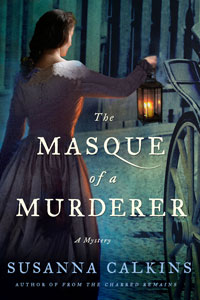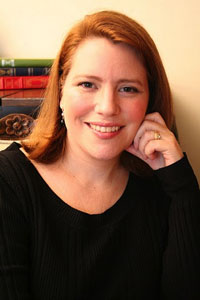Made It Moment: Susanna Calkins
Susanna Calkins has an unconventional path to publication, and an unconventional Moment. Perhaps there is no such thing as convention when it comes to this writing life. In any case, I think the words below will speak to anyone who ever questioned his or her “right to write”. How many of us have kept this passion of ours secret, at least for a while? I certainly did, and I can admit now that it came from a sense of shame. Why wasn’t I succeeding? Susanna’s secret–that sounds like a title for a novel!–had different origins, but when she finally let it go the same thing happened for her that does for us all. We become writers.
My made it moment may be a little different than that of other authors Jenny has so generously hosted on her blog. I spent eight years working on a PhD in European history, and a few more years after that as an assistant professor of history. I always enjoy telling people about how when I was a graduate student I first discovered the murder ballads that prompted my first historical novel, A Murder at Rosamund’s Gate, but the reality is it took me a very long time before I began to write that story.
It wasn’t so much that I felt pressed for time, although that was certainly the case, or that I wasn’t sure I could even write a full-length novel (let alone one that anyone might want to publish), which was also true. I just did not feel free to write creatively. I was supposed to be writing for other academics, not for readers. Only after I took a different academic job did I begin to feel freer from those constraints.
And even when I did finally begin to write that first novel, I did so in fits and spurts. A scene here. A scene there. Never knowing how those pieces would connect, but always so happy to indulge in what I called then my little secret hobby. I didn’t tell anyone I was writing a novel—not even my husband—for years (years!), until I had written about 300 rather oddly constructed pages. At that point I let him into the secret, and a few other trusted souls after that.
But even after I got my agent and my contract with Minotaur a short time later, I was still very hesitant to let my academic colleagues know about my books, especially those from my graduate school. It was hard to let go of the feeling that I had failed as a historian because I write historical fiction.
However, a funny thing started happening after my first novel came out. I started receiving nice emails from readers, saying how much they had learned about 17th century England from reading my books. That they had hated history in high school and college, but that my books had kindled a real interest in the social, political, cultural events from the period. I’ve been teaching at the college level for nearly 20 years, and there is a good chance that I have reached more people with my novels than I ever did in a classroom. That is both humbling and empowering at the same time.
So my made it moment?
When my former professors began to congratulate me on my writing—on my decision to do something unconventional (at least for them!) with my knowledge of history. It’s not that I needed their validation to feel proud of my novels—it was more the realization that they understood that I had used the graduate training and knowledge they had provided me. It was just not as anyone had expected. Indeed, the research I did for my dissertation, which focused on 17th century Quaker women, grounded my third book in the series, THE MASQUE OF A MURDERER. So for me, the very act of incorporating my research into my historical mysteries, and seeing my stories in print, and hearing from my readers about what they had learned, all make me believe ‘I made it.’
Susanna Calkins has been intrigued by murder ever since she first stumbled across 17th century murder ballads in grad school. The idea that people used to sing about murder and other strange tales became the premise of her historical mysteries featuring Lucy Campion. Set in 17th century plague-ridden England, her second novel–From the Charred Remains–is short-listed for the LCC Bruce Alexander Historical Mystery Award.







Susanna! My name is Savannah, I write historical fiction, and I’m a redhead. Why haven’t we met?! I love your blog about how the crimes stories were sung–often with a subtle joke the audience of the day would get. I have to pick up your books! So glad you came here to Jenny’s blog!
I love your blog about how the crimes stories were sung–often with a subtle joke the audience of the day would get. I have to pick up your books! So glad you came here to Jenny’s blog!
Comment by Savvy — April 14, 2015 @ 10:46 am
Hi, Susanna! I can relate to your moment. I teach for the English department, so the thought of my colleagues reading my novel made me uneasy since my novel was not the kind of high brow literary novel full of allusions that academics write. To this day, I don’t tell them about my journal publications for fear of seeming puerile.
Comment by Sara — April 14, 2015 @ 11:35 am
Thank you, Jenny for having me. You do so many wonderful things for authors (and readers!), including this blog!
Savannah–thanks for your nice words–hope its okay that I’m really a brunette, the lighting just made my hair look a little more red.
Sara–It’s funny; I work with many faculty from across my university, and sometimes in casual conversation it will come up that I write these books. Many many times, these faculty will whisper to me, ‘hey I’m writing a novel too!’ I’m seriously thinking of how I can start an online club to support these hidden authors.
Comment by Susanna — April 14, 2015 @ 12:18 pm
Susanna and Jenny,
It is great to read your interview with Susanna. I had the pleasure of meeting Susanna and the LIM conference in Chicago last February. Lori Rader-Day introduced me to Susanna and suggested I might want to read her new book THE MASQUE OF A MURDERER. I enjoy how Susanna has her main character working hard to make a life for herself and stay loyal to friends. Int 17th century London they didn’t have internet searches, cell phone to call for help, crime labs to check out clues, and easy transportation My guess readers become involved in Susanna’s story they forget the lack of the bells and whistles and enjoy the ingenuity of the apprentice printer. Your have found a way to share your love for history and create a unique hook for your readers Keep us all guessing
You can tell the story is well researched and you can also tell Susanna has a love for history. It doesn’t surprise me that Susanna wrote and didn’t tell anyone until a book comes and becomes a best seller.
It has been my pleasure to read most all genres and as a reviewer for AUTHORS ON THE AIR I have had the opportunity to meet great people who just happen to be very good writer. Susanna’s fans will be waiting holding their breath for book four in the Lucy Compton Mystery series.
Of course Jenny, I can’t miss the opportunity to point out readers are waiting patiently for your upcoming book. Thanks Jenny for sharing your author friends with us.
John
Comment by John Kurtze — April 14, 2015 @ 12:41 pm
How wonderful. When you’re a teacher at heart, that idea that you can reach so many more people with a novel than with 20 years of teaching is pretty stunning, isn’t it? And very empowering.
Comment by Sandra Hutchison — April 14, 2015 @ 12:47 pm
Correction: You don’t know how intimidating it is to write comments regarding a professor who is a good writer. It gets worse when you know the comments are on Jenny Milchman blogs. The correct last name of Susanna’s main character is Lucy Campion.
Sorry Susanna.
John
Comment by John Kurtze — April 14, 2015 @ 12:49 pm
John, thank you for your lovely words about my book! No worries about Lucy’s last name. Sometimes people call her “Lucy Champion” and I think, ‘hey, she IS kind of a champion for the downtrodden ‘
‘
Sandra–thank you! It’s just been a very unexpected side benefit to writing these novels. And actually, I have to admit, when I do talks at libraries, schools and bookstores etc I really enjoy talking about the history (plague! Fire! Murder!) than I do discussing the ins and outs of my books or my writing process. I do torture myself when I get something “wrong,” but most people are generous with my mistakes!
Comment by Susanna — April 14, 2015 @ 12:57 pm
Thanks for sharing, Susanna!
I love a novel that can entertain and teach simultaneously. It makes me feel far less guilty when I ignore the kids, the housework and my own writing to read it!
Comment by Lori — April 14, 2015 @ 2:27 pm
You reminded me of my favorite high school teacher. We learned from him because he presented history as stories. He kept things interesting and I’ll never forget him — Mr. Mercer. Thank you so much for the memory, and I’m happy for your outcome.
Comment by Marja McGraw — April 14, 2015 @ 3:12 pm
Lori, great! I am all about guilt-free reading! I feel the same way!
Marja–I love hearing about wonderful teachers like your Mr. Mercer. So often when I teach I only get the horror stories of people having had to memorize tons of dates and figures and it was sad because the fascinating stuff seemed to have been left out.
Comment by Susanna — April 14, 2015 @ 4:01 pm
What an excellent and interesting story, Susanna. Thanks for sharing.
Comment by Sandra — April 17, 2015 @ 9:25 pm